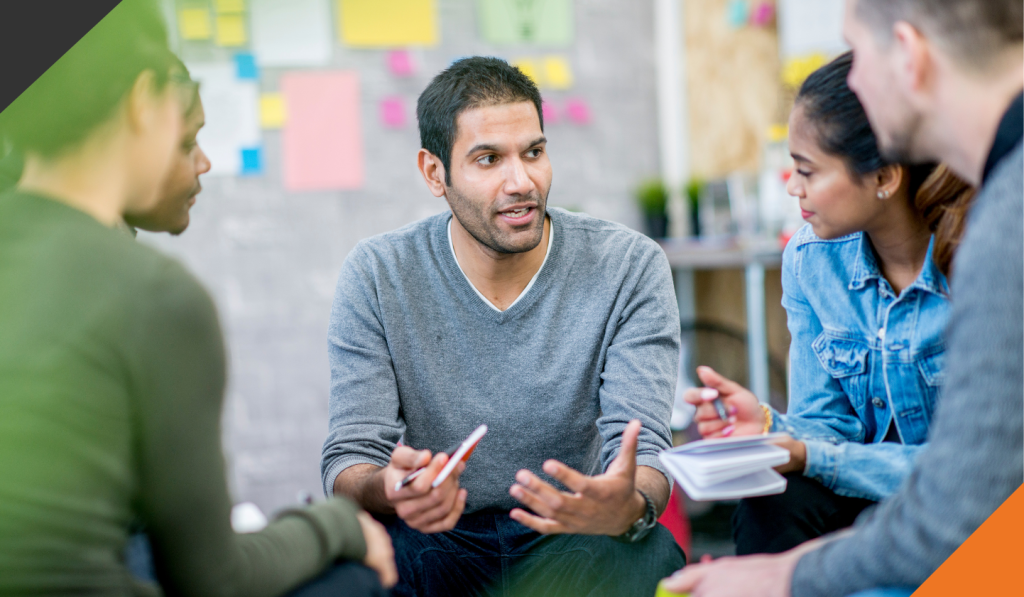
Self-awareness is critical to so many aspects of leadership development. In order to continue to build your skill in motivating and inspiring people to accomplish great things you have to know yourself. You must know both your strengths and weaknesses as well as how you react to others.
As we have continued to research and develop tools around stress & resilience in the workplace, self-awareness always tops the obstacles of critical skills.
Part of the problem with self-awareness is that all of us think we are more self-aware than we are.
In fact study after study reveals that 95% believe they are self-aware but when tested the number have high levels of self-awareness drops to 10-15%.
Another way to describe self-awareness is to self-monitor or to become an observer of your internal world. It’s the ability for measured introspection.
Self-awareness puts you in control of your life. Because you can step back and view your life, decisions, and reactions as an impartial observer, you gain the power to act with intention rather than reaction.
If self-awareness is such a critical skill what are the actions you can take right now to begin deepening this skill?
MINDFULNESS / MEDITATION
You are not your thoughts. Grasping this one truth leads immediately to better self-awareness. Our thoughts and reactions stream through our minds so fast, it can be difficult to understand our motivations and feelings.
Practicing some form of meditation has proven to not only calm the mind but help you become an observer of your thoughts and actions.
Yes, there are dramatic stress reduction benefits due to the relaxed state you must enter to become mindful. The biggest benefit is how much you begin to understand yourself.
Meditation can be simple. Merely calming yourself, counting your breath, and attempting to focus on one thought is enough. It’s easy to become despondent in the early attempts due to the cascade of thoughts and distractions that run through your mind. Don’t despair, the exercise of meditation is enough to build self-awareness muscles. When you find your mind begins to wander, stop and come back to your center. Five to ten minutes per day is a great place to begin.
PERSONALITY TESTING
Rigorous scientifically backed personality testing can give you great insight into your strengths and weaknesses. You also learn how to work best and what gives you energy and motivation.
There are many to choose from in the marketplace. Sometimes it is helpful to take multiple tests to give you a broader view of yourself.
At Fierce, we are a big fan of the DISC assessment, and use it with every client before customizing a learning journey. Using assessments, you learn how you respond to conflict, what motivates you, what stresses you out, and how you solve problems.
JOURNALING
Journaling should be less of a diary and more of a place for self-reflection. Use your journal to detail your goals and priorities. Becoming clear in these areas helps you understand yourself more fully and allows you to align your behavior, decisions, and values with integrity.
Over time you gain a better sense of who you are and who you want to become. You start to learn where to place your energy and where to expect and prepare for difficult conversations and decisions.
One of the early American Fathers, Ben Franklin, followed an interesting journal practice that allowed him to continue developing into a stronger, more capable leader.
He kept a balance sheet of the assets and liabilities of his own character traits. Over time he would work to grow his character assets and minimize his liabilities. His intention was to increase his own “net worth”.
NETWORK HONESTY
Self-awareness is difficult to do completely on your own. Incorporating inputs from others along with your own self-reflection will build a depth of awareness.
You need a network of people you can trust. These can be peers, managers, and even the team members you lead. Each person will see different aspects that others may miss. You will gain deeper Empathy because you learn to see yourself through another person’s eyes.
This can be a difficult step for many of us because it requires a deep level of vulnerability and trust in the process. However, the rewards are great if you use that feedback to understand yourself.
BIOFEEDBACK
The way our bodies react to life can provide an immense amount of data about our energy cycles and stress events.
As biofeedback tools like wearable devices have become readily available with sophisticated measurement systems, we are able to track countless internal measurements.
The body is smart and changes via heart rate, breathing, and release of various chemicals in response to our environment. This new research into biofeedback is the backbone of Fierce’s new Pulse technology.
We sync into your wearable tech to help you identify stressful events in your day. Early participants reduced symptoms of stress within 2 weeks of using. The reason biofeedback works is that it is a fast way to build self-awareness. Seeing your internal markers allows you to understand a hidden part of your own personality.
There’s no doubt self-awareness can improve your leadership and build stress-proof resilience. You become more productive and enhance your people skills when you know yourself.
Fierce has built several programs around enhancing self-awareness such as our new Resilience program.
Whatever path you choose, implement these five actions into your professional development and watch your leadership skills improve.


